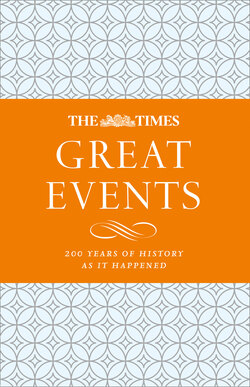Читать книгу The Times Great Events - Группа авторов - Страница 21
ОглавлениеTHE CHARGE OF THE LIGHT BRIGADE
14 November 1854
As they passed towards the front, the Russians opened on them from the guns in the redoubt on the right, with volleys of musketry and rifles. They swept proudly past, glittering in the morning sun in all the pride and splendour of war. We could scarcely believe the evidence of our senses! Surely that handful of men are not going to charge an army in position? Alas! it was but too true – their desperate valour knew no bounds, and far indeed was it removed from its so-called better part – discretion. They advanced in two lines, quickening their pace as they closed towards the enemy. A more fearful spectacle was never witnessed than by those who, without the power to aid, beheld their heroic countrymen rushing to the arms of death. At the distance of 1,200 yards the whole line of the enemy belched forth, from 30 iron mouths, a flood of smoke and flame, through which hissed the deadly balls. Their flight was marked by instant gaps in our ranks, by dead men and horses, by steeds flying wounded or riderless across the plain. The first line is broken, it is joined by the second, they never halt or check their speed an instant; with diminished ranks, thinned by those 30 guns, which the Russians had laid with the most deadly accuracy, with a halo of flashing steel above their heads, and with a cheer which was many a noble fellow’s death-cry, they flew into the smoke of the batteries, but ere they were lost from view the plain was strewed with their bodies and with the carcasses of horses. They were exposed to an oblique fire from the batteries on the hills on both sides, as well as to a direct fire of musketry. Through the clouds of smoke we could see their sabres flashing as they rode up to the guns and dashed between them, cutting down the gunners as they stood. We saw them riding through the guns, as I have said; to our delight we saw them returning, after breaking through a column of Russian infantry, and scattering them like chaff, when the flank fire of the battery on the hill swept them down, scattered and broken as they were. Wounded men and dismounted troopers flying towards us told the sad tale – demi-gods could not have done what we had failed to do. At the very moment when they were about to retreat an enormous mass of Lancers was hurled on their flank. Colonel Showell, of the 8th Hussars, saw the danger, and rode his few men straight at them, cutting his way through with fearful loss. The other regiments turned and engaged in a desperate encounter. With courage too great almost for credence, they were breaking their way through the columns which enveloped them, when there took place an act of atrocity without parallel in the modern warfare of civilized nations. The Russian gunners, when the storm of cavalry passed, returned to their guns. They saw their own cavalry mingled with the troopers who had just ridden over them, and, to the eternal disgrace of the Russian name, the miscreants poured a murderous volley of grape and canister on the mass of struggling men and horses, mingling friend and foe in one common ruin. It was as much as our Heavy Cavalry Brigade could do to cover the retreat of the miserable remnants of that band of heroes as they returned to the place they had so lately quitted in all the pride of life.
Following the outbreak of the Crimean War, in which France and Britain became involved to prevent Russia from expanding its reach by exploiting the decline of the Ottoman Empire, the allied forces besieged Sevastopol, home to the Black Sea fleet. The Russians counterattacked the British lines at the nearby port of Balaklava.
When some captured British guns began to be dragged away, Lord Raglan, the army’s commander, wrote an order to Lord Lucan, who led the light cavalry, telling him to avert this. From where he was, Lucan could not see the guns and the vague gestures of the officer who delivered the message, Captain Nolan, led him to presume Raglan meant him to attack the artillery positions in front of him, suicidal though this was.
About 670 cavalrymen set off along the mile of what Tennyson’s celebrated poem would commemorate as the ‘Valley of Death’. More than 300 were killed, wounded or taken prisoner in the charge.
It was witnessed by war correspondent William Howard Russell, whose reports for The Times detailing the conditions endured by soldiers suffering from cholera led to Florence Nightingale’s nursing mission, and eventually the resignation of the Prime Minister, the Earl of Aberdeen.
